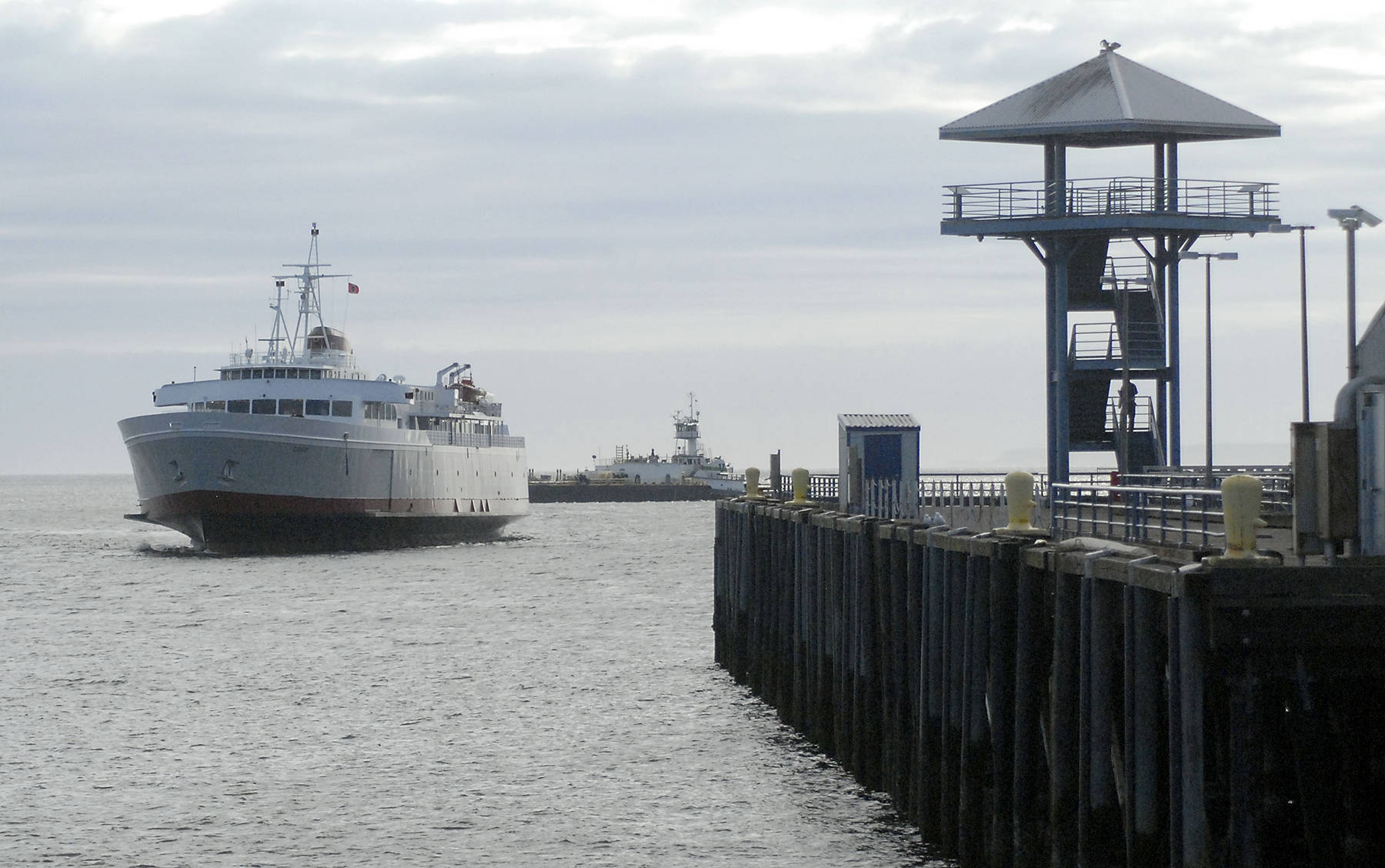Black Ball Ferry Line’s Coho ferry could be shut down through December and might not be back in service until spring 2021, severely jeopardizing the Port Angeles company’s ability to stay afloat, co-owner Ryan Malane said May 21.
Canadian restrictions on nonessential travel due to the coronavirus pandemic, which have corralled the 1,000-passenger ferry since March 29, have a 20 percent chance to be eased by December in a best-case scenario, according to Destination BC, the provincial government’s tourism marketing corporation.
Those restrictions are 60 percent likely to continue until spring 2021, according to estimates presented during an April 30 online meeting recorded at tinyurl.com/PDN-CohoBC.
“No business plans to have zero revenue for a year,” Malane said. “It would be devastating for us financially.”
The return of international travel to Canada is contained in the last phase of a four-phase recovery plan.
The return of international tourism to Canada depends on one of three conditions being fulfilled, Marsha Walden, the president and CEO of Destination BC, said during her presentation.
The other conditions are widespread vaccination for COVID-19, community immunity to the highly contagious virus or broad success in treating the coronavirus, she said.
The outcomes of any of those conditions being met “are very unpredictable at this point,” she said.
The timelines appear to be moving targets.
The U.S.-Canada border had been set to reopen May 28.
But Tuesday, Prime Minister Justin Trudeau announced that Canada and the United States had agreed to again extend the closure to nonessential travel for another 30 days, through mid-June, as the COVID-19 pandemic continues.
More extensions expected
During a Destination BC presentation on May 21, the agency said “international borders remain effectively closed for 2020, as indicated by the premier,” according to a slide shown that refers to B.C. Premier John Horgan and lists several other “assumptions.”
They include a prediction that domestic air travel will remain limited due to a lack of business travel, and that “travel resumes slowly, picking up momentum during the fall.”
Black Ball shut down operations March 29, a closure that was extended through May 31.
“It’s going to be very difficult for us to survive if this lasts for a very long time,” Malane said. “It will have a huge impact on Port Angeles, for sure.”
Malane said Black Ball received enough federal Paycheck Protection Program funds to cover two months of costs that will carry the company through June.
After laying off some employees, the infusion of the funds from the loan program allowed Malane to bring most of the workers back.
The company has 92 full-time employees, a workforce that increases to 130 when bulked up with seasonal workers for the summer months.
Now, it’s an open question whether a vessel that carried 475,000 passengers and 130,000 vehicles to Victoria’s Inner Harbour in 2019 will ply the Strait of Juan de Fuca any time soon.
“We have prepared for rainy days like everyone else,” Malane said. “Those funds can run out, too.”
Malane said he continues to discuss solutions with 6th District U.S. Rep. Derek Kilmer of Gig Harbor and U.S. Sens. Patty Murray of Seattle and Maria Cantwell of Mountlake Terrace. All three are Democrats.
“They’ve been very supportive,” Malane said.
Malane said he is trying to look at the border closures in 30-day increments.
“It’s been a pretty gray area to see the tourism side of government identify these timelines,” he said.
Restrictions on any nonessential travelers who enter Canada, including Canadian residents returning home, are subject to strict regulations, Malane said.
The Coho could transport essential goods such as fuel and food “in a very limited way,” Malane said.
“However, revenue from that wouldn’t come close to covering our operating costs,” he said.
“We would lose easily hundreds of thousands of dollars a month, so it’s not commercially viable.”
About 28 percent of travel on the Coho is non-leisure, and of that, a smaller percentage would qualify as essential travel under the entry restrictions.
As of March 26, all travelers entering Canada except essential workers are subject to a 14-day isolation period under the country’s Quarantine Act.
It covers all Canadian citizens, permanent residents and foreigners.
Canadian public health officials ensure that those entering the country adhere to the isolation protocol.



